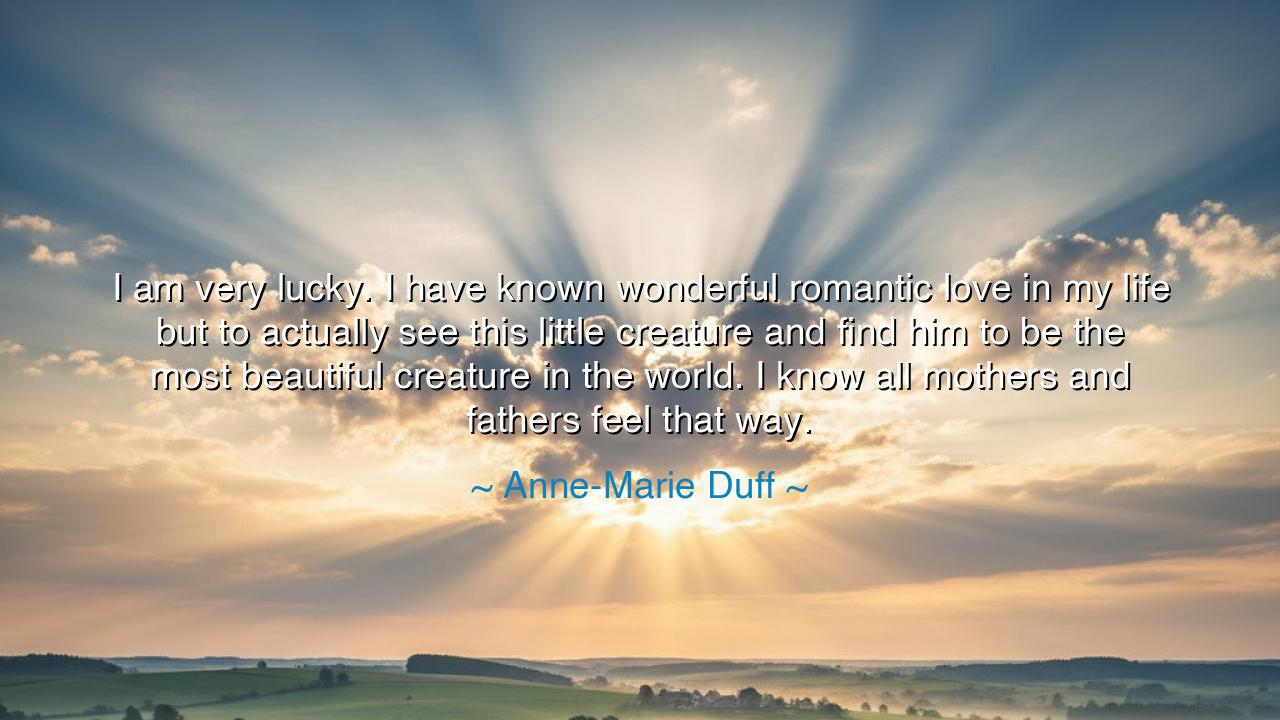
I am very lucky. I have known wonderful romantic love in my life
I am very lucky. I have known wonderful romantic love in my life but to actually see this little creature and find him to be the most beautiful creature in the world. I know all mothers and fathers feel that way.






The words of Anne-Marie Duff—“I am very lucky. I have known wonderful romantic love in my life but to actually see this little creature and find him to be the most beautiful creature in the world. I know all mothers and fathers feel that way.”—are tender, luminous, and filled with the awe of creation. In them she distinguishes between two great loves: the romantic love that binds two souls in passion and companionship, and the love of a parent for a child, which is both humbler and more transcendent, a bond that is fierce, protective, and eternal.
To have known romantic love is already to have been fortunate. It is the love sung by poets, the love that inspires art and sacrifice, the love that makes the world seem brighter for its presence. But Duff tells us that beyond this, there lies another love, one deeper still: the love awakened at the sight of one’s child. She calls the child “this little creature,” for in truth, a newborn is fragile, helpless, and unformed. Yet in the eyes of the parent, that creature becomes the very image of beauty, more radiant than any jewel, more majestic than any crown. This is the transformation of the heart that only parenthood brings.
This truth has echoed through history. Consider the ancient tale of Hector of Troy, the mighty warrior. In Homer’s Iliad, there is a scene where Hector, before riding to battle, holds his infant son, Astyanax. Even as the shadow of war looms, Hector gazes upon the child with tenderness, praying that he will grow strong and noble. In that moment, the warrior, feared upon the battlefield, becomes simply a father, entranced by the beauty of his son. Like Duff, Hector reveals that the heart of a parent holds a love greater than even the love of glory or romance.
The meaning here is profound: that the parent’s love is not earned, but given freely. Romantic love grows through attraction, trust, and shared life; but the love for a child erupts instantly, a flood that requires no proof. The helplessness of the child is not a barrier but the very source of this devotion. To find one’s own child “the most beautiful creature in the world” is to experience a love unclouded by reason, a love rooted in the mystery of life itself.
Duff wisely adds, “I know all mothers and fathers feel that way.” This is not vanity, but recognition of a universal truth. Across nations and centuries, parents have held their children and felt the same wonder—that this fragile being, unknown yesterday, is now the very center of the universe. It is a love that equalizes kings and peasants, artists and laborers, for in the presence of a child, all are humbled, all are transformed.
The lesson we draw is this: cherish the loves of your life, but know that each has its own sacred place. Romantic love teaches us passion, devotion, and companionship. Parental love teaches us sacrifice, humility, and the miracle of life renewed. Do not confuse the two, nor diminish one against the other. Instead, let them coexist, as branches upon the same tree, each bearing its own fruit.
Practically, this teaching calls us to honor family with reverence. For those who are parents, it is a reminder to see in your children not burdens, but blessings—the “most beautiful creatures” entrusted to you. For those who are not, it is a call to recognize and support the sacred labor of parenthood, and to treasure the bonds of love in whatever form they come. Above all, it is a reminder to live with gratitude, as Anne-Marie Duff does, declaring herself “very lucky” to have known both the fire of romance and the quiet majesty of parenthood.
Thus, her words shine as a beacon for generations: that love has many forms, each precious, each transformative. And among them all, the love of a parent for a child stands as one of the greatest mysteries and greatest gifts life can bestow. Romantic love may inspire poems, but parental love writes itself upon the soul for eternity.






AAdministratorAdministrator
Welcome, honored guests. Please leave a comment, we will respond soon